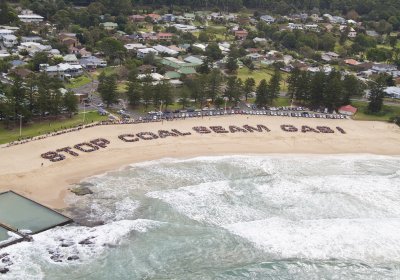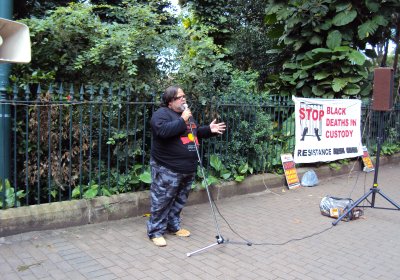Members of various activist groups joined a roadside anti-privatisation protest in Booragoon, Western Australia on June 3.
The groups responded to the call by the “In Public Hands” campaign group to campaign for public ownership of the soon-to-be-built Fiona Stanley Hospital.
Protesters held placards reading “Don’t privatise our hospitals” and “Honk if you support anti-privatisation”, which received plenty of responses from passers-by.
Australia
More than 3000 people turned out to Austinmer beach in the Illawarra on May 29 to form a “STOP COAL SEAM GAS!” human sign.
Three helicopters, each from a big media outlet, circled above the cheering and waving crowd to film the historic event.
Check out all the pictures and media coverage by visiting Stop CSG Illawarra's website: stop-csg-illawarra.org.
A big team of more than 40 volunteers from Stop CSG Illawarra helped make the day such a success.
Toowoomba’s Catholic community expressed shock at the sacking of Bishop William Morris after a five-year Vatican investigation. But Father Peter Kennedy, of South Brisbane church St Mary’s in Exile, wasn’t surprised.
Sacked from the church in 2009 for “unorthodox practices”, Father Kennedy continues to front his congregation at the Trades and Labour Council building courtesy of the Queensland Council of Unions.
He, along with many others in the St Mary’s community, is responsible for Micah Projects, now one of Australia’s most respected homelessness projects.
More than 40 people attended a meeting on May 22 in the Wollongong suburb of Corrimal titled, “The future of local government in Wollongong; can it be community driven and democratic”?
Wollongong City Council has been under adminstration since March 2008 after the ALP-dominated council was sacked for systemic corruption.
An election is scheduled for September 3 for all councillor positions, including Lord Mayor.
Trade unionists, socialists, Greens and community activists attended the meeting, which was organised by Broad Left.
The deal to restructure the collapsing timber industry in Tasmania is struggling to make headway. Logging continues in old-growth forests at the same time as sawmills and woodchip mills close and more workers lose their jobs.
Anti-logging protests are being held weekly outside the premier’s office in Hobart, and the talks between environment and industry groups continue despite a key player pulling out in frustration.
The Wilderness Society (TWS) suspended its involvement in the Tasmanian Forest Agreement on May 18, citing a failure of leadership from state and federal governments.
A big ad campaign — “Australia says yes” — began this month to support the federal government’s proposed carbon tax. The campaign has been organised by a coalition of peak environment and social justice organisations including GetUp!, the Australian Conservation Foundation and the Australian Council of Trade Unions.
One of the people featured in the advertisements is actor Cate Blanchett. Her presence attracted the ire of conservative politicians and commentators as soon as the commercials aired.
The Australian government has received heavy criticism in recent weeks for its inhumane treatment of refugees, in particular its “swap” deal with Malaysia and its mandatory detention policy.
Federal Greens MP Adam Bandt and independent MP Andrew Wilkie moved a parliamentary motion on May 30 condemning the plan to send 800 asylum seekers to Malaysia.
Alice Springs is a town unlike any other and to an outsider its racial tensions are noticeable. Walking through the shopping centre one sees security guards tell Aboriginal people to move on when they are window shopping.
Poverty and homelessness are visible — and visibly black.
It has always been a town that has struggled with dealing with this visible poverty — and the less visible disadvantage of the communities in the town camps.
It has been back in the spotlight with a rise in social problems caused by an influx of Aboriginal people from other places.
Aboriginal community leader Sam Watson called a rally outside state parliament on June 1 to demand a new Royal Commission into Aboriginal deaths in custody.
The rally also condemned the Queensland Police Union (QPU), who have demanded the Queensland government pay the legal costs incurred by Senior Sergeant Chris Hurley during his defence case about the 2004 death in custody of Palm Island man Mulrunji Domadgee.
Watson told the rally: “We as taxpayers should not be paying for the legal costs of Hurley and the QPU.
Forty years after the first equal pay test case, the gap between male and female wages continues to widen.
Australian Bureau of Statistics figures, released on May 20, 2010, put the pay gap (as of February 2010) at 18%. Women on average now earn $239.30 a week less than men. The pay gap increased 0.5% over the past quarter (from 17.5%) and 1.5% over the past year (from 16.5%).
The gap is now at its highest level since August 1994. This pay gap means, on average, Australian women have to work an extra 66 days to earn the same as men.
Three hundred teachers from across NSW rallied outside NSW Parliament House in Macquarie St on June 4. They were joined by members of the Public Service Association, the Fire Brigade Employees Union, the NSW Nurses Federation and other unionists.
The teachers left a session of the New South Wales Teachers Federation (NSWTF) council to protest the Liberal government’s plan to strip away conditions and limit wage rises of public sector workers.
At the rally, the NSWTF councillors declared their support for other public sector workers and the unions NSW campaign against the changes.
About 200 people gathered on the steps of Victorian parliament house on June 3 for a “Swear In” to protest against new laws that give police the power to fine people for swearing.
Colleen Hartland, Greens member of the legislative council, spoke of the civil liberties implications while protesters chanted potty-mouth slogans in a show of defiance to police.
The protest was organised through Facebook and was called on May 31. By June 3, the event invitation had been circulated to more than 10,000 people. This demonstrates just how unpopular the laws are.
- Previous page
- Page 826
- Next page











